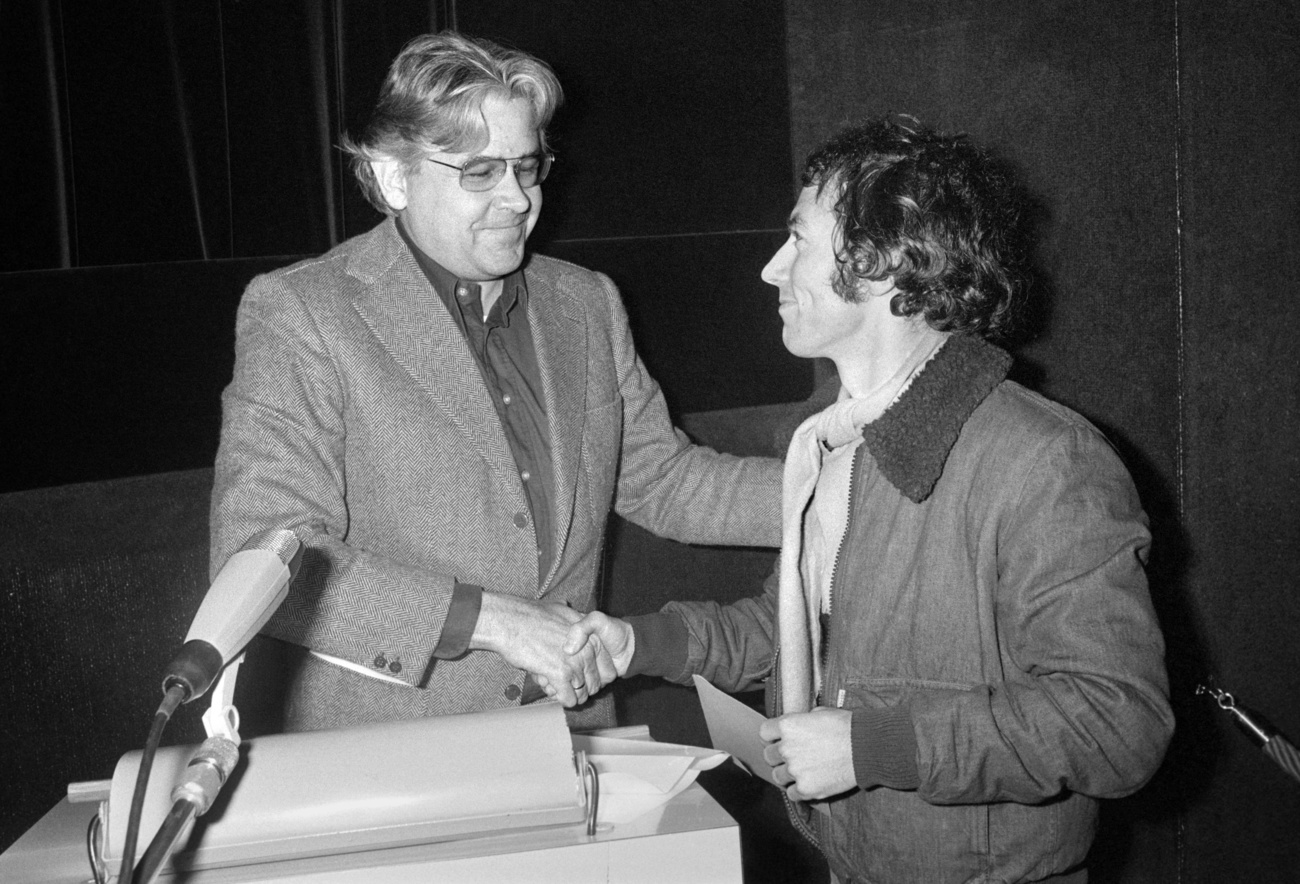
Controversial Swiss war traitor gets a revamp

A new film about Ernst Schrämli, a Swiss soldier executed for treason during the Second World War, illustrates the shifting public consensus about Switzerland’s fraught wartime politics.
On January 31, 1976, the Solothurn Film Festival played host to the world premiere of Richard Dindo and Niklaus Meienberg’s documentary The Execution of the Traitor to the Homeland Ernst S. (Die Erschiessung des Landesverräters Ernst S.). A key work of the then-flourishing Young Swiss Film movement – Switzerland’s answer to the Nouvelle Vague – Ernst S. put forward a provocative thesis.
Based on the case of Ernst Schrämli, the first of 16 Swiss citizens executed for treason during the Second World War, Dindo, an activist filmmaker, and Meienberg, a leftist journalist and historian, sought to expose the hypocrisy at the heart of Switzerland’s wartime policies.
To them, Schrämli, a young soldier found guilty of passing on military equipment and imprecise intel to a German agent, was emblematic of the Swiss state making an example of workers and soldiers for relatively low-level infractions whilst turning a blind eye to weapons manufacturer Emil Georg Bührle, whose factories exported weaponry to Nazi Germany, and the various Nazi sympathisers within the upper echelons of Switzerland’s military and political apparatus.
The response to Ernst S., one of the first major Second World War-themed Swiss films since the 1950s,was considerable. Although reviews were generally appreciative, centre-right and right-wing establishment figures and institutions painted the films as a far-left polemic that grossly mischaracterised Switzerland’s wartime calculus.
This negative view was shared by university professors, members of cantonal executive branches, the newspaper Neue Zürcher Zeitung editorial board, even Federal Councillor Hans Hürlimann.
As a result, Ernst S. was denied distinctions, contrary to the recommendations of expert commissions. These were composed of film journalists and critics who were overruled by political figures. Following the film’s first television broadcasting in 1977, the families of two military officials portrayed in the documentary successfully sued for libel and effected the change of certain passages.

From controversy to prestige
Forty-eight years later, the discourse has shifted. On October 5, 2024, the Zurich Film Festival played host to the world premiere Michael Krummenacher’s period drama The Traitor (Landesverräter). A typical example of a high-budget Swiss prestige production, the film tells the fictionalised story of Ernst Schrämli (played by Dimitri Krebs), a charming young ne’er-do-well, who, in the early 1940s, is drifting between mandatory military service, factory labour, and vagrancy.
One night, he meets a mysterious German (Fabian Hinrichs), who suggests that Ernst might have a future as a singer in Berlin, if he can get his hands on a travel visa. Luckily, the man has the necessary connections to obtain such a document – but of course, our protagonist must offer something in exchange.
The journey from Ernst S. to The Traitor is a textbook example of a change in public consensus. What was the purview of controversial left-wing intellectuals in 1976 is the stuff of populist mass entertainment in 2024.
Traitor: singular or plural?
Indeed, on the surface, Krummenacher’s film even retains the critique Dindo and Meienberg levied against the Swiss military-industrial-political complex, as evidenced by the film’s original title: Landesverräter (“traitor to the homeland”) could be either singular or plural, allowing for the interpretation that the “Ernst S.” case is about more than just one supposedly treasonous individual.
This is made all but explicit by both the film and its promotional material. The Traitor’s poster features mug shot-style pictures of Dimitri Krebs, Fabian Hinrichs, Stefan Gubser (who plays Ernst’s careerist legal guardian), and Luna Wedler (who plays a villainous factory owner’s daughter, with whom Ernst has a fateful affair), complicating the apparent clarity of whom the title refers to.
Krummenacher’s most conspicuous directorial flourish, meanwhile, is the motif of individual characters breaking out into song in pivotal moments, where they make a choice that is to Ernst’s detriment. In a final crescendo, all these individuals combine into a veritable choir of unprosecuted co-traitors for whom Ernst effectively takes the fall.
Yet, this translation of the tragic life of Ernst Schrämli from a journalistic documentary into an entertaining drama with mass appeal and major box office aspirations comes with its share of pitfalls, not all of which The Traitor manages to circumvent.

More
Death penalty is finally consigned to history
Filmic pitfalls
For one, there is the issue of narrative framing. Even though the film’s opening makes it clear that Krummenacher and his co-writer Silvia Wolkan have taken their share of artistic liberties with the material, the story’s basic historicity still lies at the centre of the production’s primary pitch to its audience. The Traitor appeals because it recounts an infamous chapter from Switzerland’s somewhat recent past from the perspective of a man who was killed for his alleged crimes against the nation.
Hence, the film must square its desire to not stray too far from the historical record with its attempts to reclaim Schrämli as a tragic (anti-)hero. This results in a series of strange plot machinations that cast the protagonist as the hapless victim of implausibly personal vendettas.
Take the way in which Krummenacher and Wolkan deal with the historical Schrämli’s criminal record, which included a conviction for attempted rape. In The Traitor, this turns into a consensual sexual encounter between Ernst and 17-year-old Gerti (Luna Wedler) that is then used against the former by Gerti’s jealous husband-to-be.

For another, there is the shift in thematic focus that comes with these efforts to promote Schrämli from emblematic working-class fall guy to a suitable main character. Despite the film’s identification of fascism-appeasing politicians, self-serving army officials, and Nazi-sympathising industrialists as the antagonists of the tale, The Traitor ultimately plays more like Schrämli apologia and less like an indictment of the Swiss “reason of state” during the Second World War.
Uncomfortable consensus
One might argue that this is the nature of shifting public perceptions of history. Ernst Schrämli was executed 82 years ago this November; Ernst S. was released almost half a century ago. Since then, critical evaluations of the relationship between Switzerland and Nazi Germany have become part of the academic mainstream.
However, one might also ask whether Schrämli’s story is feasible as anything other than the metaphor deployed by Dindo and Meienberg, given that even its most charitable version revolves around a man collaborating with Nazis for personal gain.
On the other hand, the notion that Switzerland’s reflections on its wartime history have reached a conclusion, even if only a provisional one, is a doubtful proposition, especially when one considers the raging political debates about Swiss neutrality in the context of Russia’s invasion of Ukraine and the ongoing efforts to conduct provenance research on the Kunsthaus Zürich’s controversial Bührle collection. That’s the same Bührle who supplied weapons to the Wehrmacht, and whose name is conspicuously absent from The Traitor.

More
Bührle Collection: Ann Demeester on art, war, and context
Edited by Virginie Mangin and Eduardo Simantob/ds

In compliance with the JTI standards
More: SWI swissinfo.ch certified by the Journalism Trust Initiative
































You can find an overview of ongoing debates with our journalists here . Please join us!
If you want to start a conversation about a topic raised in this article or want to report factual errors, email us at english@swissinfo.ch.